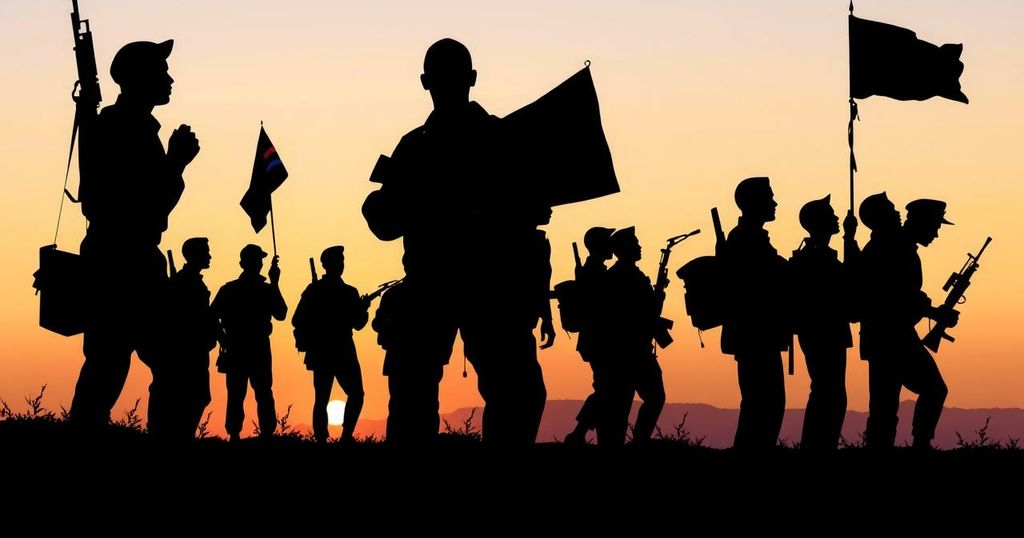The remains of 42 South African freedom fighters were repatriated from Zimbabwe and Zambia on Wednesday for reburial in their homeland. This effort, part of a government initiative, aims to honor those who died during the struggle against apartheid and provide closure to their families. Notable figures among the returned remains include Duma Nokwe, Florence Mophosho, and Basil February. Deputy President Paul Mashatile highlighted the importance of educating future generations about these sacrifices. President Cyril Ramaphosa will hold a ceremony before the remains are handed over to families for reburials across the country.
JOHANNESBURG — The remains of 42 South African freedom fighters, who met their demise while in exile in Zimbabwe and Zambia during the struggle against apartheid, were repatriated to South Africa on Wednesday. This significant event was marked by their reception at the Waterkloof Air Force Base in Pretoria, attended by government officials and members of the families. These remains were excavated from their resting places in Zambia and Zimbabwe for the purpose of reburial in their homeland. This initiative forms part of a broader government endeavor aimed at providing closure to the families of those who sacrificed their lives far from home while fighting against apartheid as members of the African National Congress (ANC) and the Pan Africanist Congress (PAC). Prior to the dismantling of the apartheid regime in 1994, numerous activists sought military training abroad, with aims to return and oppose the oppressive system. Many sought refuge in Zimbabwe and Zambia, where the anti-apartheid movement had a more formidable underground presence, as well as to evade the oppressive actions of the South African regime. Officials noted that among the remains returned were notable figures, including Duma Nokwe, Florence Mophosho, and Basil February. During a Heritage Day event, South Africa’s Deputy President Paul Mashatile emphasized that this undertaking is integral to instilling knowledge in future generations regarding the sacrifices made during the struggle against apartheid. “As a national memory project, this initiative aims to commemorate, celebrate, educate, promote, preserve, conserve, and provide a durable testament to South Africa’s road to freedom,” stated Mashatile. President Cyril Ramaphosa is scheduled to preside over a homecoming ceremony for the returned remains on Friday before the families receive them for reburial across the nation. Additionally, the government noted its ongoing efforts to repatriate remains of other South Africans from various countries, including Lesotho, Ethiopia, Tanzania, and Angola. Deputy Defense Minister Bantu Holomisa expressed his hopes that this process would facilitate connections between families and others who perished under challenging circumstances abroad.
The repatriation of the remains of South African freedom fighters is part of a government initiative to honor and give closure to families whose loved ones fought against apartheid and died in exile. Many of these activists escaped oppressive regimes by seeking refuge and military training in neighboring countries such as Zimbabwe and Zambia, where the anti-apartheid movements were stronger. The African National Congress, led by figures like Nelson Mandela, was forced to relocate its operations to Lusaka, Zambia, when banned in South Africa. The deaths of these freedom fighters while abroad and their burials away from home necessitated the current repatriation efforts, which are also aimed at educating future generations about their sacrifices. This initiative reflects a commitment to historical memory and the recognition of the struggles endured during the fight for equality and justice in South Africa.
In conclusion, the repatriation of the remains of 42 South African freedom fighters from Zimbabwe and Zambia marks a significant moment in honoring those who sacrificed their lives for the liberation of their nation. This thoughtful process of returning their remains aims not only to provide closure for the families affected but also to educate future generations on the pivotal role these individuals played in the struggle against apartheid. The government’s commitment to uncovering the history of those who fought for justice remains steadfast, as illustrated by the ongoing efforts to repatriate other remains from across various countries.
Original Source: www.newsday.com







